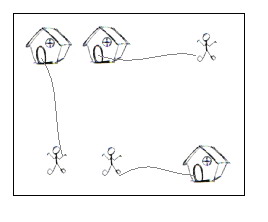hdu 三部曲 Going Home 最小费用最大流 EK算法
Problem Description
On a grid map there are n little men and n houses. In each unit time, every little man can move one unit step, either horizontally, or vertically, to an adjacent point. For each little man, you need to pay a $1 travel fee for every step he moves, until he enters a house. The task is complicated with the restriction that each house can accommodate only one little man.
Your task is to compute the minimum amount of money you need to pay in order to send these n little men into those n different houses. The input is a map of the scenario, a '.' means an empty space, an 'H' represents a house on that point, and am 'm' indicates there is a little man on that point.
![]()
You can think of each point on the grid map as a quite large square, so it can hold n little men at the same time; also, it is okay if a little man steps on a grid with a house without entering that house.
Your task is to compute the minimum amount of money you need to pay in order to send these n little men into those n different houses. The input is a map of the scenario, a '.' means an empty space, an 'H' represents a house on that point, and am 'm' indicates there is a little man on that point.

You can think of each point on the grid map as a quite large square, so it can hold n little men at the same time; also, it is okay if a little man steps on a grid with a house without entering that house.
Input
There are one or more test cases in the input. Each case starts with a line giving two integers N and M, where N is the number of rows of the map, and M is the number of columns. The rest of the input will be N lines describing the map. You may assume both N and M are between 2 and 100, inclusive. There will be the same number of 'H's and 'm's on the map; and there will be at most 100 houses. Input will terminate with 0 0 for N and M.
Output
For each test case, output one line with the single integer, which is the minimum amount, in dollars, you need to pay.
Sample Input
2 2
.m
H.
5 5
HH..m
.....
.....
.....
mm..H
7 8
...H....
...H....
...H....
mmmHmmmm
...H....
...H....
...H....
0 0
Sample Output
2
10
28
**************************************************************************************************************************
最小费用最大流 EK算法
***************************************************************************************************************************
![]() View Code
View Code

1 #include<iostream> 2 #include<string> 3 #include<cstring> 4 #include<cstdio> 5 #include<queue> 6 #include<stack> 7 #include<algorithm> 8 #define inf 0x7fffffff 9 using namespace std; 10 int pre[501],cost[501][501]; 11 int dis[522],cap[521][521]; 12 int vis[511]; 13 int que[10000011]; 14 int n,m,k,i,j,src; 15 int end1,s; 16 char str[1001]; 17 int top1,top2; 18 struct node 19 { 20 int x,y; 21 }H[1001],man[1001]; 22 23 int bfs()//注意用STL超时 24 { 25 for(int it=0;it<=end1;it++) 26 dis[it]=inf; 27 memset(vis,0,sizeof(vis)); 28 int base,top; 29 base=top=0; 30 que[top++]=src; 31 dis[src]=0; 32 vis[src]=1; 33 pre[src]=0; 34 while(base<top) 35 { 36 int fs=que[base++]; 37 vis[fs]=0; 38 for(int it=1;it<=end1;it++) 39 { 40 if(it!=fs&&cap[fs][it]>0) 41 if(dis[it]>(dis[fs]+cost[fs][it]))//此处找到最小费用 42 { 43 pre[it]=fs; 44 dis[it]=dis[fs]+cost[fs][it]; 45 if(!vis[it]) 46 { 47 que[top++]=it; 48 vis[it]=1; 49 } 50 } 51 } 52 } 53 if(dis[end1]==inf) 54 return -1; 55 return 1; 56 57 } 58 int EK()//算出最小费用最大流 59 { 60 int jt,kt; 61 int sm=0; 62 int min1=inf; 63 while(1) 64 { 65 kt=bfs(); 66 if(kt==-1) 67 break; 68 for(int it=end1;it!=0;it=pre[it]) 69 { 70 jt=pre[it]; 71 if(min1>cap[jt][it]) 72 min1=cap[jt][it]; 73 } 74 for(int it=end1;it!=0;it=pre[it]) 75 { 76 jt=pre[it]; 77 sm+=cost[jt][it]*min1; 78 cap[jt][it]-=min1; 79 cap[it][jt]+=min1; 80 } 81 } 82 return sm; 83 84 } 85 int main() 86 { 87 while(scanf("%d%d",&n,&m)!=EOF) 88 { 89 if(n==0&&m==0) 90 break; 91 top1=top2=0; 92 for(i=0;i<n;i++) 93 { 94 scanf("%s",str); 95 getchar(); 96 for(j=0;j<m;j++) 97 { 98 if(str[j]=='H') 99 { 100 H[top1].x=i; 101 H[top1++].y=j; 102 } 103 if(str[j]=='m') 104 { 105 man[top2].x=i; 106 man[top2++].y=j; 107 } 108 } 109 } 110 if(top1==0) 111 { 112 printf("0\n"); 113 continue; 114 } 115 memset(cap,0,sizeof(cap)); 116 memset(cost,0,sizeof(cost)); 117 for(i=1;i<=top2;i++) 118 cap[0][i]=1; 119 for(i=1;i<=top2;i++) 120 { 121 int x1=man[i-1].x; 122 int y1=man[i-1].y; 123 for(j=1;j<=top1;j++) 124 { 125 int x2=H[j-1].x; 126 int y2=H[j-1].y; 127 x2=x2-x1; 128 if(x2<0) 129 x2=-x2; 130 y2=y2-y1; 131 if(y2<0) 132 y2=-y2; 133 cap[i][j+top2]=1; 134 cost[i][j+top2]=x2+y2; 135 cost[j+top2][i]=-(x2+y2); 136 137 } 138 } 139 for(i=1;i<=top2;i++) 140 cap[top2+i][2*top2+1]=1; 141 142 s=0; 143 src=0;end1=2*top1+1; 144 s=EK(); 145 printf("%d\n",s); 146 147 } 148 return 0; 149 }




 浙公网安备 33010602011771号
浙公网安备 33010602011771号